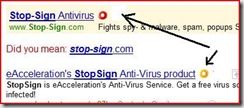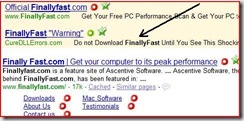Television Ads Promise Faster Downloads and Problem Free Computing
This week I saw - for the first time - the television commercials for two different *wonder* products that promise to solve all my computer frustrations, and dramatically improve my Internet speed. I was expecting these commercials. Friends on the East Coast had told me of them.
These ads featured "before people", unhappily watching a slow  download "progress" bar, installing the *wonder* product and becoming "after people". Once they were "after people" they were all smiles and their download progress bars were zippy-fast. Lots of frowning "before's" and smiling "after's".
download "progress" bar, installing the *wonder* product and becoming "after people". Once they were "after people" they were all smiles and their download progress bars were zippy-fast. Lots of frowning "before's" and smiling "after's".
These commercials are professionally done, and I must say, very convincing. I had to admit, that if I wasn't educated in IT, I would be mighty tempted to try these products. (And try them you can; both offer free scans.) I mean.. who doesn't want a blazingly fast Internet?
But, I am educated in how TCP/IP and the Internet works; how computers work (I am a Support Tech); I am studying for a major Certificate in Information Security; and, I have been a Geek since before Windows 95 was launched.. So I know (and.. if you think about it, you should too) that there is one, and only one, way to get faster Internet- pay for more bandwidth (bits-per-second).
But.. there's a sucker born every minute, and if it is on TV it must be true.
Real FACTS:
Both StopSign (from eAcceleration) and FinallyFast (from Ascentive¹) say that their product will "optimize" your computer, scan and clean the Registry, scan and clean malware infections, which will remove the "build up" and things that slow down computers.. and basically make it like new again. Oh! Yes.. and "optimize" your Internet "settings".
Okay. Fine. Sounds good.
1) Optimize your computer by - once a week - running the Disk Cleanup Tool and defrag once a month (see Rejuvenate your PC). You don't need to install more programs to do this! Much less, pay.
2) Average people should leave the Windows Registry alone; and, there is much debate in the geek community as to whether or not real, legitimate Registry cleaners/defraggers even do any good -- usually they cause more problems than they solve (particularly on machines with multiple User Accounts).
Neither StopSign nor FinallyFast have a real, legitimate Registry Optimizer, and when you Google the user forums about these products, you will find the complaints of broken machines.
If you install/uninstall lots of programs, or have recently repaired a malware infection, and want to scan your Registry, use the free CCleaner, or purchase Registry Mechanic from PC Tools.. they at least won't break anything.
3) Malware infections (viruses, worms, trojans, etc.) can most definitely slow down your machine. You - most definitely - want malware protection and removal scanners on your machine (that includes you, Mac fans). Both products have these scanners, but neither StopSign nor FinallyFast have real, legitimate ones (and by that I mean they are not on anyone's Top 10 lists)
(to see my list of free [real, and legit] anti-malware programs, click here.)
4) Anything that claims to improve your download speeds by a percentage larger than 10% is lying. There are such a thing as download managers, which use various tricks to maximize your speed but the primary reason to use them is in case of interruptions. The Firefox browser has one built-in.
If you are on dial-up, you are going to get dial-up speed.. period.
Do you really think that there's some 'hacker's trick' that will triple your Internet speed and cheat your ISP? Or.. $30 program?
If you simply must attempt to "tweak" your TCP/IP settings and see what kinds of gains are possible, use Dr.TCP from DSLReports.
But.. there's a sucker born every minute, and if it is on TV it must be true.
¹ You've seen Ascentive before in scam alerts, "Have Your PC Running Like New" — Not! And Internet Security blogger Bill Mullins' excellent Finally Fast.com - Fast Scam! Free Alternative Software
In case you haven't guessed already, what I'm saying about these televised products is don't waste your money.
Copyright 2007-8 © Tech Paul. All rights reserved.
![jaanix]() post to jaanix
post to jaanix
![]() post to jaanix
post to jaanix





